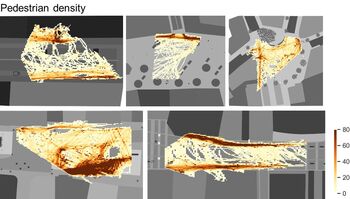
The plurality of Shared (Spaces) Streets Design

The shared space concept proposes to integrate traffic participants in a common road space to regulate traffic. The central assumption is that, by minimising traffic control and reducing segregation between traffic modes, social behaviour and negotiation-based movement replace the common traffic control measures. This concept is usually implemented in residential and urban street design to reduce traffic speed, allocate more space to pedestrians and promote the street as a public space. Although a typical shared space design presents individual components to make the space be considered as a whole, it is not a fixed physical design approach, and, therefore a wide variety of schemes exists. Due to the complexity of modelling social behaviour in these environments, analysing the impact of different designs on traffic behaviour continues to be a challenge.
Previous studies already concluded that the design influences space usage as well as the perceptions of priority assumptions and user domain. Still, they have not focused on different types of schemes to evaluate the nuances of shared space design and how it affects movement patterns. Therefore, through case studies, movement trajectory analysis and a user study, this doctoral project proposes to better understand the impact of the design elements on road users' behaviour in shared space schemes. By analysing different types of shared space solutions and design approaches, the aim is to identify certain design characteristics that contribute to ensuring comfort and safety for vulnerable road users.
Forscherin: Mariana Batista